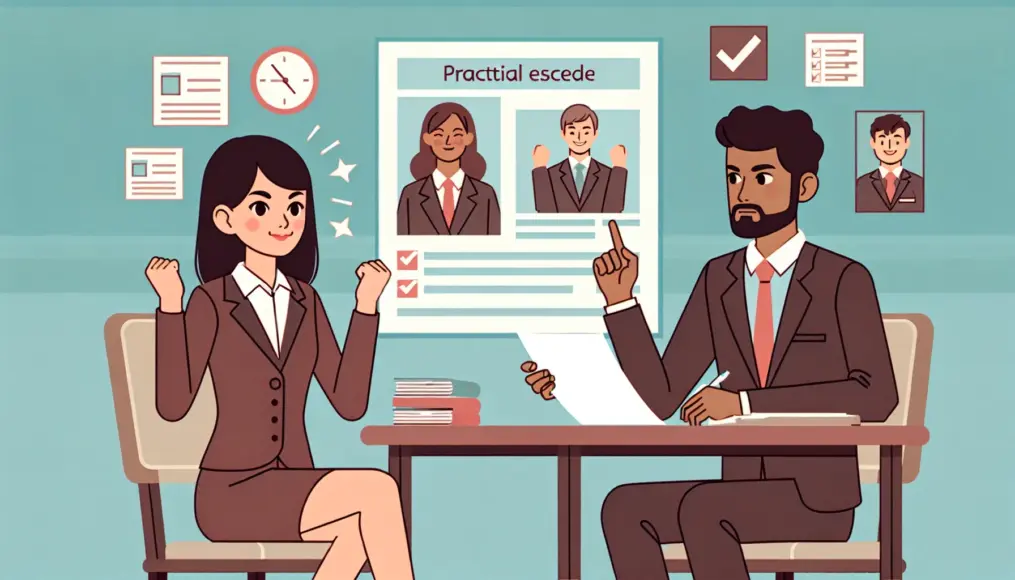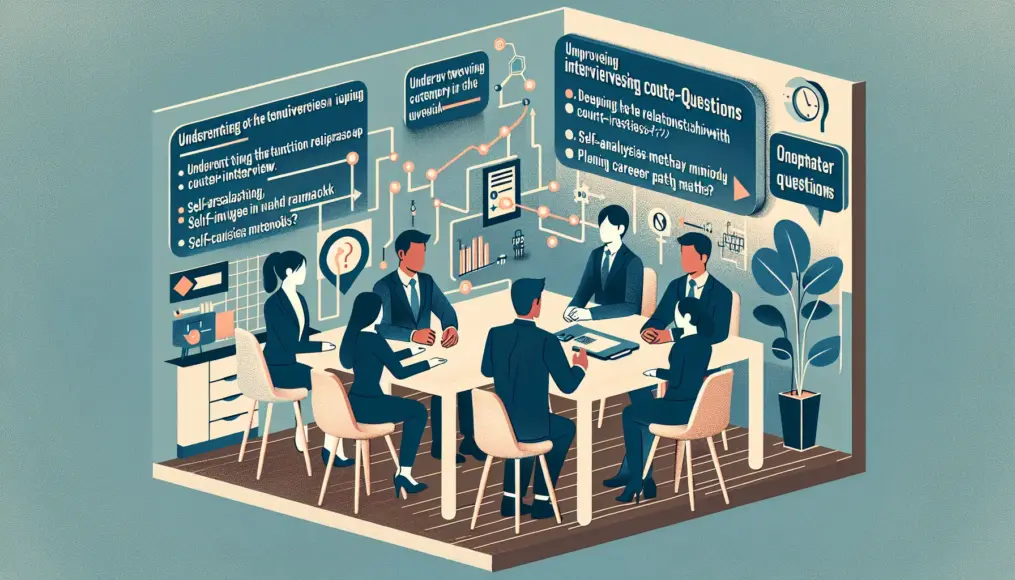Are you considering a job change but feeling anxious about the challenges of interviews? You’re not alone—many people find interviews to be nerve-wracking experiences. However, with thorough preparation, you can tackle these challenges head-on. In this article, we’ll share effective strategies and techniques based on successful experiences of those who have overcome interview hurdles.
To effectively navigate job interviews, it’s crucial to conduct in-depth research on the company and engage in self-analysis. This groundwork will empower you to respond confidently to unexpected questions during the interview. Moreover, leveraging feedback from past interviews can help you identify areas for improvement for your next opportunity. We hope this article makes your job search smoother and more successful.
- How to Stand Out in Your Interview Preparation
- Discovering Your Strengths Through Self-Analysis
- Techniques for Overcoming Challenges During Interviews
How to Stand Out in Your Job Interview Preparation
When it comes to job hunting, preparing for interviews is crucial for success. To effectively navigate the challenges that interviews present, thorough preparation is essential. By being well-prepared, you can face interviews with confidence and respond calmly to unexpected questions. In this article, we’ll explore various strategies to help you ace your interviews.
Comprehensive Company Research
Before your interview, taking the time to research the company is vital. By understanding the company’s values, culture, and operations, you can clearly convey to the interviewer how well you fit within their organization. Additionally, staying updated on recent news and industry trends allows you to contribute meaningful insights during the conversation, which can leave a positive impression.
Company research isn’t just about gathering information; it’s also an excellent opportunity to reflect on how your experiences and skills can benefit the organization. Specifically, incorporating specific stories and examples when answering interview questions can help showcase your strengths effectively.
- Understand the company’s values and culture
- Familiarize yourself with their operations
- Stay informed about recent news and trends
The Importance of Mock Interviews
Mock interviews are an incredibly effective way to prepare for the real thing. By enlisting the help of friends or family, you can create an environment similar to an actual interview, allowing you to assess your speaking style, facial expressions, and body language. Moreover, practicing with mock interviews can enhance your ability to handle unexpected questions.
Additionally, conducting mock interviews helps you identify your strengths and weaknesses, giving you the chance to pinpoint areas for improvement. By being open to feedback, you can gain valuable insights that will serve you well in your next interview.
- Create a setting that mimics a real interview
- Review your speaking style and facial expressions
- Identify areas for improvement through feedback
Learning About Your Strengths Through Self-Analysis for Interviews
When it comes to job hunting, self-analysis is a crucial step. Understanding your own strengths and values enables you to provide more specific and convincing answers during interviews. This becomes especially important when faced with challenging questions, as effectively highlighting your strengths can be a significant asset. In this section, we’ll explore how to identify your strengths through self-analysis and leverage past experiences to your advantage.
Discovering Your Strengths
The first step toward interview success is identifying your strengths. These strengths often stem from your experiences and skills. Take a moment to reflect on your past, particularly your successes and the challenges you’ve overcome. You’ll likely find that your strengths are hidden within those experiences.
For instance, if you’ve successfully led a project as part of a team, you can highlight your communication skills or leadership abilities. Additionally, lessons learned from failures are also part of your strengths. Sharing stories of how you overcame difficulties can demonstrate your adaptability and eagerness for growth to the interviewer.
- Reflect on your past
- Consider your successes and how you overcame challenges
- Articulate your strengths clearly
Leveraging Past Experiences
To make the most of your past experiences, how you communicate them in the interview is key. It’s important to use specific anecdotes to illustrate how your strengths have been beneficial. For example, detailing your role in a particular project or your contributions to the team can leave a lasting impression on the interviewer.
Furthermore, it’s crucial to show how the lessons and skills gained from your past experiences can be applied to future roles. For instance, you might say, “I believe my experience from my previous job will allow me to contribute effectively to your projects,” thereby connecting your past with your future potential.
Understanding your strengths through self-analysis significantly impacts your responses in interviews, but how you answer specific questions is equally important. If you’re looking for tips on how to tackle questions in a first-round interview, check out this article: “Strategies for Navigating First-Round Job Interview Questions! Key Points for Success.”
- Use specific past experiences
- Explain moments when your strengths were beneficial
- Show how you will apply your skills to future roles
Techniques to Overcome Challenges During Interviews
Interviews can often present unexpected questions and a level of stress that might catch you off guard. However, knowing how to tackle these challenges can help you approach your interview with greater confidence. In this section, we’ll explore specific strategies for overcoming difficulties during interviews, focusing especially on how to handle unexpected questions and tips for easing tension.
Handling Unexpected Questions
Unexpected questions in an interview can be a major source of stress for many candidates. The key to handling these situations lies in preparation. Think beyond just the typical interview questions—consider industry-specific inquiries and questions derived from your own self-analysis. This approach will equip you to respond calmly, no matter what comes your way.
When faced with a question, it’s also important to take a moment to collect your thoughts before answering. Rushing your response can lead to unclear answers or reveal signs of anxiety. By allowing yourself a brief pause to think, you can provide a more coherent and confident response. Building your preparation and adaptability for unexpected questions is crucial to achieving success in your interviews.
- Prepare for unexpected questions
- Take a moment to think before responding
- Aim for clear and organized answers
Tips for Easing Tension
To alleviate anxiety before and during the interview, several techniques can be helpful. First and foremost, deep breathing can be quite effective. When we’re anxious, our breathing tends to become shallow. By consciously taking slow, deep breaths, you can calm your mind and body. Additionally, taking some time to relax before the interview is essential. Engaging in light stretching or listening to your favorite music can refresh your mood and reduce stress.
Moreover, practicing positive self-affirmations can also be beneficial. Telling yourself things like, “I can succeed in this interview,” can boost your confidence and help ease your nerves. By implementing these strategies, you can mitigate anxiety and improve your overall performance during the interview.
In summary, overcoming challenges in interviews requires thorough preparation. If you found this article helpful in boosting your confidence, you might also be interested in this article on “100 Questions You May Encounter in Job Interviews: Paving Your Path to Success.” Learning strategies for a variety of questions can further strengthen your interview preparation.
- Practice deep breathing
- Create time to relax
- Use positive self-affirmations
Leveraging Feedback After an Interview
After an interview, receiving feedback is crucial, regardless of the outcome. Reflecting on your interview experience and gathering insights can pave the way for personal growth as you prepare for your next opportunity. In this section, we’ll explore the mindset needed to accept feedback and how to effectively apply it in future interviews.
Adopting the Right Mindset for Feedback
When receiving feedback, it’s essential to approach it with an open mind. While it can be tough to hear negative comments, viewing them as valuable information for your growth can make a big difference. It’s also important to take a moment to sort through your emotions and calmly understand the feedback you receive.
Additionally, jotting down the feedback right after you receive it is a great practice. This allows you to revisit your challenges later and clearly identify areas for improvement before your next interview. By doing this, you can turn your post-interview experience into a stepping stone for future success.
- Embrace feedback openly
- Understand the content calmly
- Take notes for future reference
How to Utilize Feedback for Your Next Interview
To effectively apply feedback in your upcoming interviews, creating a concrete action plan is vital. Start by using the feedback to identify and work on your weaknesses. For instance, if your answers were lacking in depth, practice responding to those questions repeatedly until you feel confident.
Moreover, utilize the insights gained from feedback to deepen your company research and self-analysis. By reaffirming your strengths and how they align with the company’s needs, you can prepare even more effectively for the interview. This preparation will boost your confidence and help you approach the next interview with greater assurance.
- Create a specific action plan
- Practice to build confidence
- Deepen your company research and self-analysis
Summary
When it comes to job hunting, overcoming challenges during interviews requires thorough preparation and self-reflection. By conducting research on potential employers and participating in mock interviews, you can approach your interviews with confidence. Additionally, understanding your strengths will help you respond calmly to unexpected questions. Learning techniques to ease your nerves can also enhance your performance.
Post-interview feedback is another crucial aspect of the process. Accepting the feedback you receive with an open mind and creating a concrete action plan for your next interview can lead to your growth and success. By keeping these points in mind, you can navigate interview challenges and steer your job search toward success.
- Researching companies and self-analysis are key to interview success
- Mock interviews and techniques to reduce anxiety are effective
- Use feedback to prepare for your next interview
Job hunting may be a challenge, but with proper preparation, you can definitely pave the way for success. We’d love to hear about your experiences and thoughts in the comments!



Comment